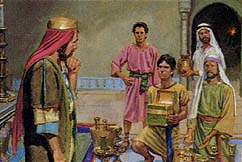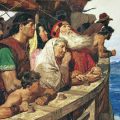We don’t usually equate the trips back and forth to Jerusalem by Lehi’s sons with the Zion’s camp in the early days of the restoration. If you look at the goals of Zion’s camp and what was happening with Lehi’s sons, you will find a number of similarities. In effect, going back to Jerusalem was their Zion’s Camp.
Review of Zion’s Camp
Here are some highlights of Zion’s camp in the early days of the restoration of the Church. Zion’s Camp was a proving ground that separated out the weak from the strong. Most of the original apostles and Seventies of the Church were selected from among the small band who made the one thousand mile trek called Zion’s Camp.
- The purpose of Zion’s Camp was supposed to be to re-establish the Saints in the homes they had been driven from in Missouri. If need be, it was to be done by show of force. They still made the trek westward, even though they only had, at most, 207 men, women, and children.
- Unlike most armies, Zion’s Camp placed a lot of emphasis upon spirituality. They prayed regularly, and didn’t travel on Sunday, but instead listened to sermons from Joseph Smith.
- Their greatest problem in the camp was the attitude of the men. There were many who complained, and there was a lot of backbiting and much contention. It didn’t help that most of their food was spoiled and rotten. It was a real exercise in patience and faith.
- Those who were unhappy generally blamed the prophet for their miseries, even though he wrought miracles in their behalf to protect them.
- Joseph promised that the faithful would receive an endowment from on high.
- The Lord revealed to Joseph that the purpose of the Camp was to try their faith.
 “Zion’s Camp chastened, polished, and spiritually refined many of the Lord’s servants. The observant and dedicated received invaluable practical training and spiritual experience that served them well in later struggles for the Church.” Church History in the Fulness of Times – Student Manual (found on lds.org)
“Zion’s Camp chastened, polished, and spiritually refined many of the Lord’s servants. The observant and dedicated received invaluable practical training and spiritual experience that served them well in later struggles for the Church.” Church History in the Fulness of Times – Student Manual (found on lds.org)
On the surface the reason for the trek west was to go rescue and defend the Saints. But the real reason they were called together was to prove those men who would subsequently be called to the highest positions in the Church. Those who proved faithful in this trial were also some of the first to be given their endowments in the Kirtland temple.
Review of Lehi’s sons
On the surface, the reason for the two trips back to Jerusalem was to get the plates and bring Ishmael’s family back to their father. Think about this. Lehi was a prophet, so why not just take care of this business before leaving town? Why would the Lord send Lehi three day’s journey out into the wilderness only to have him send his sons back to Jerusalem to take care of business he probably could have taken care of himself?
I believe the answer is much like the Zion’s Camp ordeal, it was a trial of their faith. Notice that it wasn’t Lehi who was told to return, but his sons. He had two rebellious and two obedient sons. This was a volatile mix that would try the patience and faith of all four men. Here is a breakdown of events by chapter.
Chapter 1 –
In this chapter we are introduced to Lehi’s family. We learn that his two oldest sons are cynical, untrusting of anyone’s motives. They are just as wicked as those in Jerusalem the Lord is promising to kill or have taken captive and dragged to Babylon.
Lehi’s two younger sons, Sam and Nephi are obedient and trustworthy. They believe their father when he preaches and prophecies.
Chapter 2 –
Laman and Lemuel gripe and grumble about having to leave their wealthy lifestyle and comfortable living to go live in the desert. The Lord tells Nephi his two brothers will be cut off if they don’t change. Nephi is so faithful he is made a special promise by the Lord (1 Nephi 2:20).
And inasmuch as ye shall keep my commandments, ye shall prosper, and shall be led to a land of promise; yea, even a land which I have prepared for you; yea, a land which is choice above all other lands.
Chapter 3 –
 Lehi sends his sons back to Jerusalem for the plates of Laban. Laman tries to negotiate with Laban but is thrown out and Laban tries to kill him. Laman and Lemuel are ready to go home, but Nephi and Sam encourage them to try a different tactic. They all go in this time, but now they are carrying their father’s entire fortune. They hope to buy the plates. Laban tries to kill them a second time and they are obliged to leave all their wealth in his hands.
Lehi sends his sons back to Jerusalem for the plates of Laban. Laman tries to negotiate with Laban but is thrown out and Laban tries to kill him. Laman and Lemuel are ready to go home, but Nephi and Sam encourage them to try a different tactic. They all go in this time, but now they are carrying their father’s entire fortune. They hope to buy the plates. Laban tries to kill them a second time and they are obliged to leave all their wealth in his hands.
This time Laman and Lemuel show more of their true colors. Not only do they not believe their father’s prophecies, but they don’t believe the people of Jerusalem are wicked. Now they have just lost the family’s fortune, and had a second attempt on their lives. They want out. But Sam and Nephi remain strong and faithful to the mission they were given by the Lord to find a way to get the plates. Laman and Lemuel beat their brothers, but are stopped by an angel and reproved for their lack of faith.
Chapter 4 –
Nephi puts his foot down and declares they are not going back home until they have fulfilled this commandment to get the plates. He volunteers to go into Jerusalem himself, having no idea how he will accomplish this feat or where he needs to go. He relies on the Spirit to guide him. He discovers Laban near his house. He has passed out from drinking too much.
This is the big test of faith for Nephi. The Spirit tells him to kill Laban. Nephi recoils and doesn’t want to. Then ensues a conversation between the Spirit and Nephi. Think about this. When was the last time you had a full on conversation with the Spirit, where you argued and He argued back? Nephi had obviously had quite a bit of experience with spiritual communication and prayer or he couldn’t have had this conversation.
Because the Lord had promised Nephi that his obedience would be rewarded with a land of promise, when the Spirit told Nephi that without these plates all of his posterity would dwindle and perish in unbelief, Nephi began to see the real need for these plates. Nephi finally decided that there was no other way to get them, and since the Lord had already delivered the wicked owner of the plates into his hands, he committed to following the Spirit, trusting that if the commandment came from God, he was doing the right thing, no matter how it looked on the surface. (1 Nephi 4:12 – 14)
12. And it came to pass that the Spirit said unto me again: Slay him, for the Lord hath delivered him into thy hands;
13. Behold the Lord slayeth the wicked to bring forth his righteous purposes. It is better that one man should perish than that a nation should dwindle and perish in unbelief.
14. And now, when I, Nephi, had heard these words, I remembered the words of the Lord which he spake unto me in the wilderness, saying that: Inasmuch as thy seed shall keep my commandments, they shall prosper in the land of promise.
Chapters 5/6 –
Nephi’s obedience is rewarded with the addition of Zoram to their family. Lehi discovers his genealogy on the plates, and is led to prophecy more about their posterity.
Chapter 7 –
Now that they have committed murder, lost their family fortune, stolen sacred records and have fled into the wilderness, the Lord requires the boys return one more time. But this time it is for wives. They convince Ishmael of the need to come with them into the wilderness.
As they are returning to the tent of their father, Laman and Lemuel rebel once again, but this time they actually plan on killing their brother by leaving him tied up in the desert to be eaten by wild beasts. Nephi uses his faith to get out of his bondage, and other members of the family intervene and convince them to be cooperative. Notice that each time they rebel they are a little more cruel and vicious in what they do. They are spiritually moving in one direction as quickly as Sam and Nephi are moving in the opposite direction.
Final Thoughts
The lessons we see played out with Lehi’s sons are the same lessons we see played out with Zion’s Camp. Those who were complainers and weak in the faith either stepped up their game when the trials came or they crumbled and eventually left the Church. With Lehi’s sons we see the same pattern, the polarizing of the wicked from the righteous. Sending them back to Jerusalem was a trial of their faith.

To read more of Kelly Merrill’s articles, click here.
The Lord was positioning his future leaders, preparing them for greater service. These same trials that could have saved Laman and Lemuel only served to condemn them further because of their refusal to believe and exercise faith. We can’t say the Lord didn’t give them ample opportunity to save themselves.
So often in life we are met with obstacles and challenges that seem almost insurmountable. Most of the time we don’t see these times as trials of our faith that are meant to prepare us for what the future holds. Instead we only see the immediate needs. The Lord sees the end from the beginning and if we are willing to exercise our faith each step along the way, He will consecrate our spiritual gains for a blessing on our heads and give us greater capacity for good and for joy in the future.
Kelly Merrill is semi retired and writes for https://gospelstudy.us. He lives with his wife in Idaho. His strength is being able to take difficult to understand subjects and break them down into understandable parts. He delights in writing about the gospel of Christ. Writing about the gospel is his personal missionary work to the members of the Church and to those of other faiths who are wanting to know more about Christ’s gospel and His Church.






